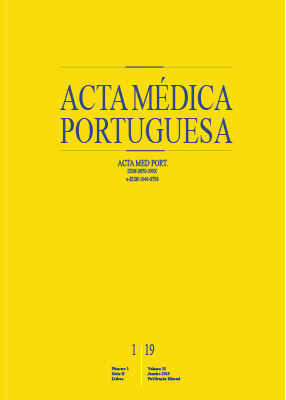Obtaining Informed Consent for Anesthesia in Elective Surgery at a Tertiary-Care Hospital: Practices and Ethical-Legal Context
DOI:
https://doi.org/10.20344/amp.10592Keywords:
Anesthesia, Consent Forms, Elective Surgical Procedures, Informed Consent/ethics, Informed Consent/legislation & jurisprudence, Liability, LegalAbstract
Introduction: Informed consent is an active process of the doctor-patient relationship, based on ethical and legal principles. The anesthetic act has inherent risks, which should be subject of specific consent. The aim of this study was to evaluate the degree of implementation of written specific informed consent for anesthesia in the context of elective surgery.
Material and Methods: An observational prospective study, at a tertiary university hospital, in 230 patients aged 60 years or older, undergoing elective surgery between May and July 2017. Eligible patients who consented to participate were interviewed clinically on the day before surgery. In the postoperative period, the anesthetic technique and the existence of the written informed consent for the anesthetic and surgical procedures were assessed. Patients who were unable to give informed consent or those admitted in the Intensive Care Unit after surgery were excluded.
Results: Written informed consent for the surgical procedure was obtained for 225 (97.8%), while it was obtained in just 96 (41.7%) patients for the anesthetic act. There was a higher prevalence of stroke, anemia, and higher Charlson and physical American Society of Anesthesiologists scores in patients without written informed consent for the anesthetic act.
Discussion: We identified a low implementation of written informed consent for anesthesia. This situation may have important implications in the context of disciplinary, civil or criminal liability.
Conclusion: Despite its importance, the practice of written informed consent for anesthesia in this institution is not yet implemented on a regular basis.
Downloads
Downloads
Published
How to Cite
Issue
Section
License
All the articles published in the AMP are open access and comply with the requirements of funding agencies or academic institutions. The AMP is governed by the terms of the Creative Commons ‘Attribution – Non-Commercial Use - (CC-BY-NC)’ license, regarding the use by third parties.
It is the author’s responsibility to obtain approval for the reproduction of figures, tables, etc. from other publications.
Upon acceptance of an article for publication, the authors will be asked to complete the ICMJE “Copyright Liability and Copyright Sharing Statement “(http://www.actamedicaportuguesa.com/info/AMP-NormasPublicacao.pdf) and the “Declaration of Potential Conflicts of Interest” (http:// www.icmje.org/conflicts-of-interest). An e-mail will be sent to the corresponding author to acknowledge receipt of the manuscript.
After publication, the authors are authorised to make their articles available in repositories of their institutions of origin, as long as they always mention where they were published and according to the Creative Commons license.









